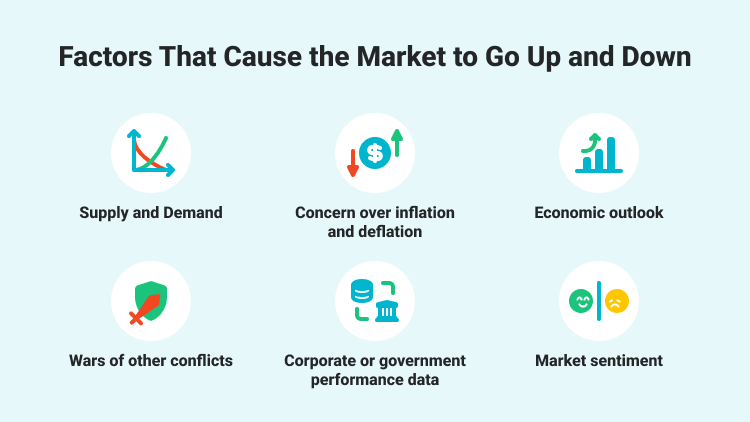
The stock price movement can be measured by a temporary difference between what stock sellers are supplying and what stock buyers are demanding. If there is a larger number of stock buyers than sellers, the buyers bid up the prices of the stocks to entice sellers to sell more. If, on the contrary, prices go down, then they may reach a level that entices buyers. Individually, stocks are dependent on the performance of the issuing company that will be valued higher in the future. Generally, there are seven factors that impact a US stock price:
- Interest rates. The Federal Reserve can raise or lower interest rates to stabilize or stimulate the United States economy, known as monetary policy. If a company borrows money to expand and improve its business, then higher interest rates will affect the cost of its debt and it has to reduce company profits and the dividends it pays the shareholders. As a result, its share price may drop. In times of higher interest rates, investments that pay interest tend to be more attractive to investors than stocks.
- Economic outlook. When the US economy looks like expansion, stock prices may rise. Investors during that period tend to buy more stocks because of possible future profits and higher stock prices. If the outlook of the economy is uncertain, investors may reduce their buying or start selling.
- Inflation. Inflation means higher consumer prices, leading to slower sales and reduced profits. Higher prices may also cause higher interest rates because the Federal Reserve will raise interest rates to curb inflation. These changes will bring down stock prices.
- Deflation. Deflation is a general decline in prices for goods and services, and falling prices tend to mean lower profits for companies and decreased economic activity. Stock prices may go down, and investors may start selling their shares and move to fixed-income investments like bonds. Interest rates may be lowered to encourage people to borrow more. The goal is to increase spending and economic activity.
- Political shocks. Political tension can affect both the economy and stock prices. For instance, the US-China trade tensions have negatively affected consumers as well as many producers in both countries, and it was weighing on the stock market. In addition, an act of terrorism can also lead to a downturn in economic activity and a fall in stock prices.
- Corporate Performance. A strong earnings report can make investors feel good about the business. If many investors look to buy it, this increased demand can help to raise the stock price. In contrast, a product recall, data breach, bad executive behavior or underperformed earning reports can all hurt a stock price.
- Market sentiment. Investor sentiment or confidence can cause the market to go up or down, which can cause stock prices to rise or fall accordingly.
- Bull market: Bull markets describe a strong stock market where stock prices are rising and investor confidence is growing. It’s often tied to an economic recovery or economic boom, as well as investor optimism.
- Bear market: Bear markets are when stock prices are falling and investor confidence is fading. It often happens when an economy is in recession and the unemployment rate is high.



